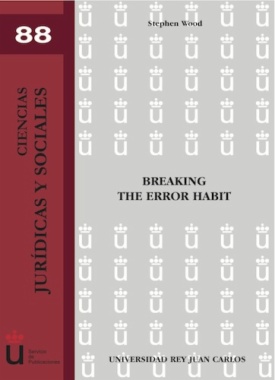Though there is virtually no limit to the number and kind of mistakes a student can make when learning the English language, the errors presented in this book have been carefully selected on the basis of three criteria. The first is how frequently the errors are made by the majority of English language students (at least until they reach fluency level); the second is the relevance and frequency of these words and structures in everyday English; and third, how badly the errors sound to a native speaker. If you want to sound like you have an acceptable domination of the English language, you must avoid committing these mistakes.
- Cover
- Title page
- Copyright page
- Table of Contents
- Introduction
- Part I: Confusing Spanish usage with English usage
- Unit 1: “People is …”
- Unit 2: “I am agree.”
- Unit 3: Use of “very much” and “a lot” with verbs
- Unit 4: “I want that you…”
- Unit 5: to have vs. to have got
- Unit 6: for vs. during
- Unit 7: to go out vs. to leave
- Unit 8: we are vs. there are
- Unit 9: all the time vs. always
- Unit 10: “The reason because…”
- Unit 11: “I borned in …”
- Unit 12: “I think that no.”
- Unit 13: “He must to go.”
- Unit 14: “He has the reason.”
- Unit 15: “Can you tell me how much is it?”
- Unit 16: “This affects to me a lot.”
- Unit 17: Last week vs. The last week
- Unit 18: “I returned to home at 8:00 o’clock.”
- Unit 19: “He has forty years old.”
- Unit 20: “The important is…” or “The responsible is…”
- Unit 21: “childs” and “fathers”
- Unit 22: “What means pepper?”
- Unit 23: “The better…”
- Unit 24: “I’m studying English for to go to London.”
- Unit 25: Placement of adjectives and enough
- Unit 26: “He got married with…”
- Unit 27: history vs. story
- Unit 28: “These kind of…”
- Unit 29: “Is typical.”
- Unit 30: “I studied informatica.”
- Unit 31: “Five millions of dollars”
- Unit 32: he vs. she
- Unit 33: form vs. way
- Unit 34: “The same that…”
- Unit 35: “He doesn’t believe nothing I say.”
- Unit 36: make vs. do
- Unit 37: “I have a friend that he…”
- Unit 38: since and for
- Unit 39: to go back vs. to come back
- Part II: Similar Words
- Unit 40: trip vs. travel
- Unit 41: funny vs. fun
- Unit 42: to stay vs. to spend vs. to pass
- Unit 43: work vs. job
- Unit 44: early vs. soon
- Unit 45: to win vs. to earn
- Unit 46: hard vs. tough vs. harsh
- Unit 47: too vs. so
- Unit 48: to remember vs. to remind
- Unit 49: bored vs. boring
- Unit 50: other vs. another
- Unit 51: used to vs. usually vs. to be used to
- Unit 52: political, politician, politics
- Unit 53: success, succeed, successful
- Unit 54: end vs. final
- Unit 55: great vs. big
- Unit 56: unique vs. only
- Unit 57: in time vs. on time
- Unit 58: last vs. latest
- Unit 59: to rise vs. to raise
- Unit 60: to die vs. to be dead vs. death
- Part III: “False friends”
- Unit 61: discuss/ discutir; college/colegio; pretend/pretender
- Unit 62: career/ carrera; investigate/investigar
- Unit 63: actually/actualmente; embarrassed/embarazada; notice/noticias
- Unit 64: expectations/expectativas; illusion/ilusión; preoccupied/preocupado
- Part IV: Confusing Structures
- Unit 65: near vs. close to
- Unit 66: next Thursday vs. this Thursday
- Unit 67: “I wouldn’t mind to go.” (gerunds vs. infinitives)
- Unit 68: “He suggested me that…” (reporting verbs)
- Unit 69: to tell vs. to say
- Unit 70: so and such
- Unit 71: to be impressed by (something)
- Unit 72: like vs. as
- Unit 73: few vs. little/a few vs. a little
- Unit 74: to listen to, to think about, to depend on… (verbs + prepositions)
- Answer Key
- Conversation Topics by Section

